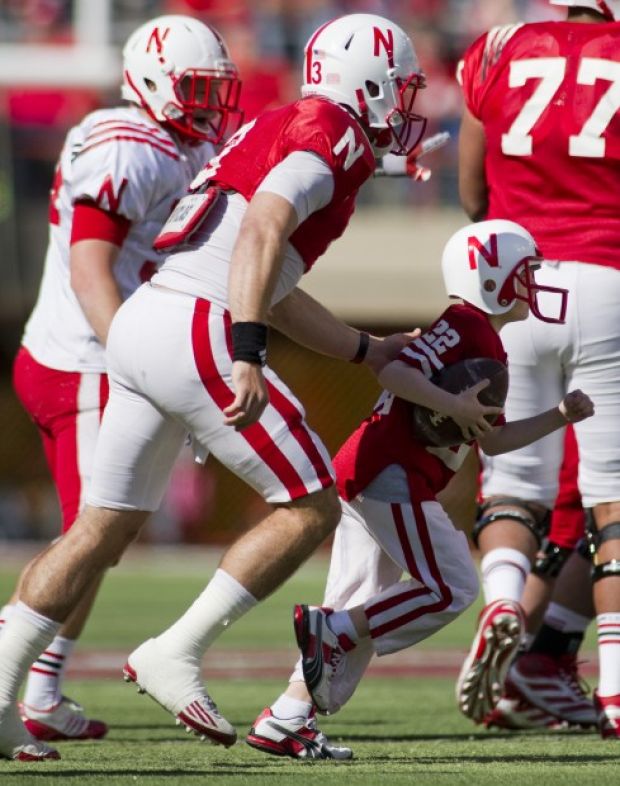It'sNotAFakeID
All-American
What really gets me is how people will try to spin Taylor's stats to conform to their opinion of him. Here's the facts:There's a lot of schools that wouldn't start Taylor even if he weren't the turnover machine that he is. Pelini has more than catered this offense around him turnovers and all like most coaches most certainly wouldn't. In 38 career games he's fumbled the ball....47 times. He's still and always will be a running back with horrible ball handling skills taboot attempting to play QB. Nothing like 4 years of it...I will put it this way. In this offense that is very QB dependent, we need a QB that isn't turnover prone for how often they have the ball.
That is why I say Chip wouldn't of started Taylor. Chip wanted a game manager who wouldn't turn the ball over because the QB plays such a strong role in the offense.
Taylor completed 62% of his passes (368 attempts) last season. That completion percentage ties Nebraska for 47th with South Carolina and USC. Taylor attempted 80 more passes in 2012 than he did in 2011, and he completed 62 of those 80 extra passes (that's a 77.5% completion percentage). Taylor passed for 23 touchdowns last year, an amount equal to his first two seasons at QB combined (10 in 2010 and 13 in 2011).
Yes, he threw more interceptions last season than he had in his career, but that's not the right way to look at that stat. The stat you want to look at is INT to TD ratio. In 2010, he threw .7 interceptions for every touchdown he threw. In 2011, that number dipped to .61 interceptions per every touchdown. And in 2012, that number once again dropped to .52 interceptions for every touchdown (meaning if he had 2 touchdown passes in a game, he probably had an interception with it as well).
Now let's go about the running game. If Nebraska lost about half the fumbles that Taylor committed, that's 24 fumbles lost. I think the general trend is that Taylor has improved in every area (some more than others), so let's say we lost 10 of those fumbles his freshman year, 8 of those fumbles his sophomore year, and 6 of those fumbles his junior year. Comparing fumbles lost to rushing touchdowns (similar to the INT/passing TD comparison) reveals that the ratio of fumbles lost to rushing touchdowns was .83 in 2010, .89 in 2011, and .60 in 2012--all of which are notably high. But Taylor will be the first to tell you that he needs to work on protecting the football, and there is no doubt in my mind that he will do a much better job of it this year.
But if we want to statistically assess his true effectiveness, one of the ways which it should be done is by taking a look at how often he scored versus how often he turned the ball over--a combined ratio. Because of his dynamic ability as a passer and a runner, both must be taken into account. So, in 2010 his overall turnover to touchdown ratio was .77; in 2011 that number dipped slightly to .72; and in 2012 that number dipped dramatically to .54.
Taylor is not only passing the ball more efficiently, he is also passing it more effectively--this talk of him not being able to play the QB position has to end, because it's being based on opinion, an opinion unsupported by the stats.
Stats are great, but there are just some things that they can't measure. Schematically, when the opposing team has a QB who can run the ball as well as throw it efficiently and effectively, it creates another player which has to be guarded against. It takes a defender, and quite possibly defenders out of the play; if Taylor looks like he's going to scramble, you can bet the house the defense will try to collapse around him, which will leave receivers wide open. If we line up and run a read play, a defensive end or a linebacker must always be on the look-out for Taylor to keep it. If they commit to Taylor, he can just hand it off to Ameer, who will more than likely get 4 or 5 yards. Planning to play Taylor Martinez isn't an easy thing to do because he can beat you even when he doesn't have the ball--and that's something a lot of college quarterbacks can't do, and a lot of college coaches would like to have on their team.



